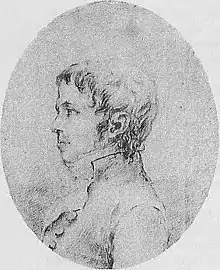Joachim Nicolas Eggert
Joachim Nicolas Eggert (22 February 1779 – 14 April 1813) was a Swedish composer and musical director.

Eggert was born in Gingst on Rügen, at that time part of Swedish Pommern. At a very young age he started studying to play the violin. In Stralsund he continued his musical education in the subjects of violin and composition. These studies were followed, in the first years of the 19th century, by studies in musical theory in Braunschweig and Göttingen, with Johann Nikolaus Forkel as a teacher.
In 1802 he got his first appointment as a Kapellmeister at the court theater of Schwerin. A year later he became violinist at the Royal Court Orchestra of Sweden. He soon received his first commissions for compositions. In 1807 he was appointed a member of the Royal Swedish Musical Academy; in the same year he made his debut as a musical director. Between 1808 and 1812 he worked as a Hofkapellmeister at the Royal Court Orchestra. He died at Thomestorp, Östergötland, Sweden, of tuberculosis, at the age of 34 years.
The main part of his compositional creations are instrumental works like operas, cantatas, musical dramas and symphonies. He also composed numerous works commissioned by the Swedish Court Orchestra. He introduced elements of Vienna Classicism into Swedish musical culture. In the course of his activities as Kapellmeister he introduced for the first time works of Beethoven's in the Swedish concert repertoire. He also gained fame by directing the first Swedish performances of Haydn's oratorio The Seasons and Mozart's opera The Magic Flute.
Selected works
- Operas
- The Moors in Spain (1809)
- Svante Sture och Märta Leijonhufvud (1812)
- Symphonies
- Symphony No. 1 in C-Major (1805)
- Symphony No. 2 in G-Minor "Skjöldebrand" (1806)
- Symphony No. 3 in E-flat Major (1807)
- Symphony No. 4 in C-Minor "War and Peace" (1812)
- Symphony No. 5 in D-Minor (Unfinished)
- Cantatas and ceremonial music.
- Funeral Music for Duke Frederik Adolf (1804)
- Cantata commemorating the peace between Sweden and Russia (1809)
- Cantata honouring the arrival of Prince Carl Johann Bernadotte to Stockholm (1810)
- Music for the Coronation of Carl XIII (1809)
- Cantata honouring the Chairman of the Stockholm Eric House. "Werdarnes evige konung" ("The world's eternal king").
- Cantata "Hwad stark gudomlig kraft" ("How mighty divine strength")
- Cantata "Ljud av salla Odens rost" ("Blessed Odin's voice")
- Chamber works
- String quartets, Op. 1: No. 1 in G. No. 2 in F-minor (c. 1810), No. 3 in F
- String quartets, Op. 2: No. 1 in B-flat, No. 2 in G-minor, No. 3 in D-minor
- String quartets, Op. 3: No. 1 in C-minor, No. 2 in G, No. 3 in A
- String quartets, WoO: in G, in D-minor, in A (c. 1800), in D (1810)
- Scherzo & Trio G-minor, for string quartet
- Fugue in D, for string quartet
- String sextet in F-minor (2 violins, 2 viola, cello and double-bass) (c. 1800–10)
- Sextet in F-minor (clarinet, French horn, violin, viola, cello and double bass) (1807)
External links
- Joachim Nicolas Eggert at Find a Grave
- Free scores by Joachim Nicolas Eggert at the International Music Score Library Project (IMSLP)
- Article about Eggert by the Israeli musicologist Avishai Kallai